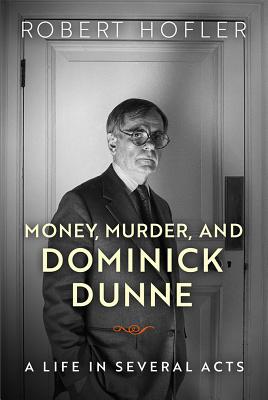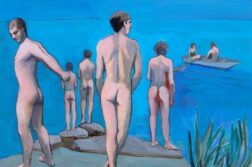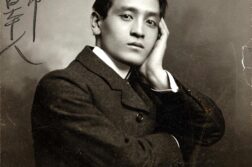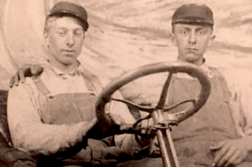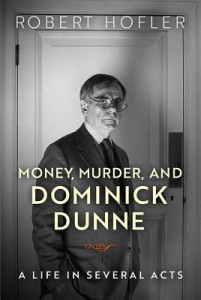 Money, Murder, and Dominick Dunne:
Money, Murder, and Dominick Dunne:
A Life in Several Acts
by Robert Hofler
Wisconsin. 352 pages, $26.95
IT WOULD BE HARD to imagine a gayer life than the one led by Dominick Dunne. Growing up in Hartford (across the street from Katherine Hepburn), he was not only called a “sissy” by his father but beaten with a riding crop, Dunne said, to get the “incipient fairyism” out of him. It was seeing Now, Voyager at sixteen that convinced him that, like Bette Davis, he could find a better life.
His idea of the latter was not confined to just the movie stars he idolized, however. He was a social climber as well, an admitted snob, and a tremendous gossip who, like Truman Capote, used stories about the rich and famous to be accepted. Although he won a Bronze Star during World War II for going back to retrieve a wounded soldier and, after the War, married and had children, he also hired hustlers, picked guys up off the street, did drugs, and used the services of Scotty Bowers (whose memoir Full Service (2012) detailing his years of supplying men to closeted movie stars was reviewed in these pages). He even produced the movie of his close friend Mart Crowley’s groundbreaking and still unsurpassed play about gay life, The Boys in the Band, fell in love with one of its stars, Frederick Coombs, and had sex with the star of The Boys in the Sand, Cal Culver (“one of the most extraordinary afternoons of my life”) for 65 dollars. He loved antiques, fine furniture, expensive clothes, and grand hotels. Inspired by the Ascot scene in My Fair Lady, he gave a Black and White ball when he was living in L.A. that inspired Capote’s more famous version in New York two years later. He took part in The Advocate Experience, a program run by David Goodstein in the 1970s to help gay men feel more at ease with their identity. He produced the films The Panic In Needle Park, Play It As It Lays, and Ash Wednesday.
His longtime companion was a painter named Norman Mabry who was there for him during his final decline. One of the honorary pallbearers at his funeral was his classmate at Williams College, Stephen Sondheim. And yet, Dunne was in the closet almost all his life, terrified that he would be outed as a homosexual, until he died of bladder cancer at 83 in 2009.
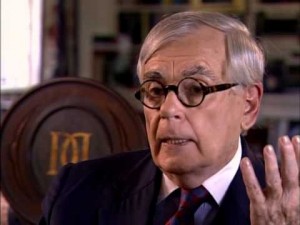
Robert Hofler, whose other books include The Man Who Invented Rock Hudson, has found in the subject of Dominick Dunne several strands that make up a fascinating portrait of American culture from the 1950s to the present. One of them is the closet. Another is Dunne’s (and our) obsession with celebrity. Another is simply the incredible violence in American life, the string of tabloid murders whose subsequent trials (the Menendez brothers, O. J. Simpson, Phil Spector, Michael Skakel) provided Dunne a second career as a reporter for Vanity Fair—after being told by his agent, following Dunne’s hitting bottom in Hollywood, “I can’t get you a picture. Nobody wants you.”
The latter makes Hofler’s book one of those redemption stories dear to American hearts—the man rejected by L.A. society as a drunken failure returns years later to cover the O. J. trial as Vanity Fair’s star columnist, the guest every A-List hostess who once ignored him must now have at her dinner party. Money, Murder, and Dominick Dunne is a tale of resentment and revenge, of enemies who become friends who become enemies of a man with an extraordinary appetite for life and a character that mixed generosity and pettiness, fair-mindedness and bias, snobbery and sympathy for the underdog. It is a record of the four tumultuous decades stretching from the Manson murders (1969) to the second O. J. Simpson trial (2007), the one that finally put him in jail not for the murder of Nicole Brown and Ron Goldman but for threatening a man selling Simpson memorabilia in a Las Vegas hotel room. And last but not least, it is the story of Dunne’s relationship with a couple known in L.A. as “the Didions”—Dominick Dunne’s younger brother, the writer John Gregory Dunne, and his famous wife Joan Didion, whose book Slouching Toward Bethlehem supplies the perfect epigraph to this saga of industrial-scale gossip: “Writers are always selling someone out.”
One never knows quite what it was that led the Didions to keep John Gregory Dunne’s older brother at arm’s length. They were not interviewed on that subject and there is no record of their private opinions. But besides a truly malicious sibling rivalry on John’s part, attested to in numerous incidents in this book, one gets the impression that they viewed Dominick as someone who threatened their own climb to the top. The successful television producer who introduced his brother and sister-in-law to the Hollywood establishment when they decided to leave New York and try their luck out West turned into an embarrassment who was once arrested at LAX in front of his family for possession of marijuana, set a room full of hustlers on fire after knocking over a candle after taking a hit of poppers, and ended up an out-of-work drunk. All the while, the Didions prospered as novelists and screenwriters.
Dominick had already left L.A. when his daughter, a promising actress, was murdered by her abusive boyfriend. When the Didions went over to the Dunnes’ house, Dominique was still on life support, one phone line was being used for condolences, and the other kept open in case the hospital should call. When Dunne went upstairs to see why the line was tied up, he found Didion using it to go over copy edits on her forthcoming book, Salvador (1983)—at least that was the story Dunne told when people asked what Joan was really like.
Hofler’s book is all about writers, from gossip columnists like Joyce Haber, Suzy, and Liz Smith, to novelists like Didion and Truman Capote—all of whom used real people as material. Though Dominick produced the film of the bleak novel Didion wrote about their milieu (Play It As It Lays), he was in such denial that he refused to see that BJ, the closeted bisexual character, was based on himself. He was too invested in his role as a man married to a rich heiress who gave parties for the A List. Capote had to beg Dunne to let him bring Alvin Dewey, the detective that Capote had made the star of his book about the Clutters’ murder, to the Black and White Party. The constant entertaining in Beverly Hills was for Dunne an intricate game of inclusion and exclusion to which he was highly sensitive. When a New York friend who found Hollywood society frivolous asked, “Who cares about those people?” Dunne replied: “I care completely whether they like me or not.” But then this was a man who also said: “I never felt I belonged anywhere, even in my own family.”
This biography of Dunne is divided in effect into two sections: the years in L.A. and the comeback in New York. Dunne’s desperate attempts to be included in the Hollywood A List—the pettiness, the cruelty, the ambition, the vanity—make the first part more entertaining than Dunne’s coverage of the famous murder trials for Vanity Fair (though there are details that surprise, like Dunne’s developing a crush on Erik Menendez, and also falling for Mark Fuhrman, the handsome detective at the Simpson trial). The years in Hollywood are so entertaining because, throughout his party-giving and gossiping and initially successful career as a producer, Dunne was, he admitted later, “the architect of my own destruction,” a snob and an “asshole”—apparently, the template for the alcoholic homosexual with a cutting tongue. After saying that Ash Wednesday—a screenplay written by the boyfriend of the powerful agent Sue Mengers—should have been called “When a fat girl falls in love,” Dunne was told he’d never work again. But the list of people he annoyed extends far beyond Mengers. Leslie Abramson, the defense attorney at the Menendez brothers’ trial, referred to Dunne as “the little puke, the little closet queen.” Sinatra considered Dunne such a phony he paid a hit man fifty bucks to punch him in the head—a story Dunne loved to tell—to dislodge the toupee Dunne wore to cover a bald spot on the crown of his head.
Dunne’s hitting bottom seems to have been a result of many things—his drinking and drugging, his cutting remarks, his manic pursuit of social success. But the real reason he was no longer employable was, in true Hollywood fashion, that Ash Wednesday bombed. Working with Elizabeth Taylor had to have been a dream-come-true for a man who had enraged his father by cutting out pictures of movie stars in his room instead of playing sports, but the movie was a nightmare—a shoot during which almost everyone was drinking heavily, and each day Elizabeth Taylor arrived for work later and later, till Paramount began sending Dunne telegrams with the immortal exhortation, “Get that fat pig on the set!” “You know,” Taylor finally told Dunne, “this is going to be your last film.” It was. For the social-climbing Dunne, however, the kiss of death came the evening he was not asked to be one of the two hundred guests at agent Swifty Lazar’s post-Oscar party. When “you were not in the top two hundred in Hollywood,” Hofler writes, “you were worse than dead. You were the uninvited.” And when Dunne could not get the A List to come to a dinner he threw for two visiting British aristocrats, he threw in the towel.
Dunne, however, was not without resources when, socially dead, separated from his wife, and unable to get work, he finally left L.A. for a cabin in Oregon to write the sequel to Joyce Haber’s best-selling novel The Users. Haber was the gossip columnist Dunne would call the day after a party to tell her who was there and what had happened, because Haber drank so much she couldn’t remember. Dunne, on the other hand, knew so much about the people who’d dropped him that, he said, “I’ve listened to their farts.” And later, when he began writing his own novels, he used everything he’d heard. The method was simple: “You can write whatever you want,” he said. “Just change the names.”
The name changes were so obvious that no one was fooled, however, and, like Capote after publishing his notorious roman à clef, Answered Prayers, Dunne ended up on some people’s hate list. But he didn’t seem to care. His first novel (The Two Mrs. Grenvilles) was based on a society murder case that Capote had already used in Answered Prayers, which, when published in Esquire, reportedly led the real-life model for the murderous wife to kill herself. When Dunne published his own portrait of New York society (People Like Us), his editor worried that Dunne would suffer the same social ostracism that Capote had. But Dunne was calm. They were rich people, he said, they’d just have to get over it—a philosophy that did not assuage his own distress when his sexual orientation was exposed. “He would dish but hated to be dished about,” said one of his assistants at Vanity Fair, who “recalled when OUT magazine columnist Michelangelo Signorile wrote about Dominick’s sexual orientation and how ‘upset Dominick got.’”
Dunne claimed toward the end of his life that he’d not come out because it was a “complicated thing.” There were the ex-wife and the kids to worry about. “When you have children, it is difficult. It negates your whole life,” he told a gay couple he befriended before his death. When a colleague who was aware of Dunne’s double life told him, “The most difficult thing to live with is dishonesty,” Dunne replied, “I know. I know. But it’s such a thing.” Even when he came out at the end of his life, he claimed to be a “closeted bisexual celibate”—the perfect Catholic solution—though Scotty Bowers is quoted in Hofler as saying that he did business with Dunne till the very end.
DUNNE’S LIFE is interesting, not simply because he exemplified so many of the traits associated with gay men of the postwar era (the alcohol, the closet, the feeling that one was an outsider who did not deserve success), but also because of the way he used gossip to get what he wanted. Truman Capote did the same thing, and so did the New York socialite Jerry “the Walker” Zipkin, who was best friends with Nancy Reagan and Betsy Bloomingdale and who seems to have been particularly despised not only by Dunne but also by Larry Kramer, who sent him up in his play about the Reagans, Just Say No, as the character Foppy Schwarz. Dunne, Capote, and Zipkin were all gay men who revealed other people’s secrets in order to social climb, though Dunne loved to tell his stories to absolutely anyone: cab drivers, fellow reporters, cops, and strangers on the airplane. “Sit down, you won’t believe what I’m about to tell you,” was one of his favorite lines. The other was, “I never repeat gossip, so listen closely the first time.” It’s as if gossip was the other side of the closet’s coin (I’ll tell you about everyone else because I can’t tell you about myself)—though Capote and Zipkin were hardly in the closet. When Zipkin laughed out loud one evening after Dunne tripped while walking down the aisle of a theater in New York, Dunne turned around and hollered, “You cunt!” Mart Crowley said Dunne and Zipkin hated each other “because they were the same person.” Which means, I suppose, that Dunne was despising himself. Lest we forget, the theme of The Boys in the Band is self-hatred.
But consider the times. Capote, Zipkin, and Dunne—along with Gore Vidal—all lived in a country where you could be blacklisted by the literary establishment for writing a novel like The City and the Pillar, where homosexuals were equated with Communists, and Catholics were not much better—until John F. Kennedy became president. One wonders if the disapproval with which the Didions seemed to regard Dominick was not influenced by his queerness. In the cabin in rural Oregon where he holed up after fleeing L.A., Dunne wrote three letters admitting he was gay—one to his shrink, one to his sons, and one to his brother John. The one to his sons he never sent, and the one to his brother was ignored, depressing Dominick further. It was only in the guise of Gus Bailey, the narrator of Dunne’s last novel, Too Much Money, that Dunne finally came out as a gay man. (If you want to read a succinct description of Dunne by Dunne himself, read that novel’s prologue.) “I’m beyond eighty, you know,” Gus tells his lawyer. “Mustn’t have any more secrets. Can’t die with a secret, you know.” On that point, his son, actor–producer Griffin Dunne, had the last word: “It is so typical of him,” he told Hofler, “to come out and then leave. And here I am being asked and answering the question. It’s just perfect.”
Capote and Dunne were both writers who, the older they got, the more they relied on real life for their subject matter. But Dunne, according to the blurb for Too Much Money by Tina Brown, his editor at Vanity Fair, was “the only person writing about high society from inside the aquarium.” Still, if you read just the prologue of Too Much Money, you will sense the outsider status immediately—much like Jonesy, the drifter living at the Y who narrates Capote’s Answered Prayers. Yet Dunne eventually succeeded in a way that he never imagined. By the time he wrote Too Much Money, his novels had sold three million copies, and he was so famous that he no longer had to look for gossip, it came to him, from people in all walks of life who simply needed, he said, someone to listen. “Dominick often joked about his resemblance to a defrocked priest,” writes Hofler, “and thought it was why people felt comfortable confiding in him.”
Then, one evening on a radio show, he passed on a rumor he’d heard about Gary Condit—the congressman whose intern, Chandra Levy, was later found murdered in a Washington park—that induced Condit to sue Dunne for eleven million dollars for libel. Until then, gossip had been Dunne’s ticket to fame and fortune. With gossip, he could feel In, not Out. Gossip proves you belong—you know something because you know somebody—particularly when it involves name-dropping. But the inclusion that you demonstrate by telling the tale can also lead to your exclusion when the subject hears that you’ve spilled the beans. Like Capote, Dunne never seemed able to resolve his ambivalence toward being In. “Dominick craved acceptance,” the CNN correspondent at the Claus von Bulow trial said. “On the one hand, Dominick had a degree of disdain for that segment of society, on the other hand, he wanted to be accepted by them.” What the works of Capote, Dunne, and even Proust all have in common is a theme of longing to belong to an elevated stratum of society that, once penetrated, proves to be banal, vulgar, even grotesque. All three writers went into society and then wrote books that revealed its emptiness. All three had a sensitivity to slight, a sense of being an outsider, due in part, surely, to their homosexuality. Of course, their reputation as writers is very different. Neither Dunne nor Capote comes close to the scope and wisdom of Proust’s vision. There was no way Capote could write an American version of In Search of Lost Time. People would object to comparing Dunne to Capote, for that matter, though Dunne’s admirers claim he’s an American Trollope, and there is something to that argument. The dialogue in Too Much Money can be clunky, and some of the scenes half-assed, but the book is utterly convincing. This really is, one thinks, how these Park Avenue society women, and the nouveau riche pursuing them, behave. And when the plot lines come together at the funeral of a character based on New York philanthropist Brooke Astor, the satire of an entire city and social class is brilliant and scathing.
It’s ironic, in retrospect, that Dunne, the closeted gay man, gave such short shrift to other people’s privacy. But when Michael Korda, Dunne’s first editor, said that “There’s nothing the public enjoys more than the rich and the powerful in a criminal situation,” writes Hofler, “Dominick remembered a ‘boing’ going off in his head. ‘That’s my life!’ he thought.” He was right. He had finally found his vocation. And, given the level of violence in human affairs, there was never a shortage of material. Class resentment, moral outrage, and defiance may have animated both Dunne and his books, but what he was describing deserved it.
But now, with Hofler’s book, Dunne is the subject of the stories, and reading Hofler one has to try to figure out who was the person describing individual scenes. You could argue that biography itself—the “falsest of the arts,” said F. Scott Fitzgerald—is composed of gossip, from Plutarch to the present. Hofler’s biography of Dunne is not particularly cerebral; it’s one anecdote after another, a smorgasbord of dish—unlike another book in which Dunne appears, the biography of Joan Didion by Tracy Daugherty that came out two years ago (The Last Love Song), which tells some of the same anecdotes we encounter in Hofler from a different viewpoint. In that book, Don Bachardy is quoted as saying that John Gregory Dunne was obviously gay, which made him wonder why he was married to Didion, a woman who disliked homosexuals—though “fairies” was the word she used. Whose story do we believe?
Even in biographies, with their selection of anecdotes, interview sources, and viewpoints, one never knows. What seems genuine was Dunne’s enchantment with fame, with celebrity—even a habit of going to celebrity funerals. “It’s morbid,” said a friend. “I know,” said Dunne, “but it’s fun.” So was the fact that eventually people recognized him on the street. “I love being famous,” he said. And he never condescended to any of it. One day after being spoken to by a tall man in the parking lot outside the O. J. Simpson trial, he asked Shirley Perlman, a reporter for Newsday, “Do you know who that was?” And Perlman said no. “That was John Bryan!” Dunne exclaimed. Perlman still had no idea. “He’s the guy who sucked Fergie’s toes!!” said Dunne excitedly. (Fergie, lest we forget, was for a while the wife of Prince Andrew.) Of gossip and celebrity, we apparently cannot get enough. Whatever motivated Dunne’s fixation on the secrets of the rich and famous, Hofler’s book is a riveting first attempt to figure out this Zelig-like figure who personified so many of the issues that faced gay men of his generation, and ours—since it’s naïve to think the closet is a thing of the past, especially in Hollywood. Dunne’s life is like a B movie that touches cultural issues more deeply than anything from the so-called A List.
Andrew Holleran’s novels include Dancer from the Dance, Grief, and The Beauty of Men.


